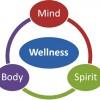CYBERMED LIFE - ORGANIC & NATURAL LIVING
CYBERMED LIFE - ORGANIC & NATURAL LIVING
 Mind-Body Therapies: Mind–body interventions are medical and pseudomedical interventions based on the idea of the mind influencing the physical body. The category was introduced in September 2000 by the United States National Center for Complementary and Integrative Health (NCCIH), so encompasses primarily complementary and alternative medicine interventions, but also includes scientifically validated practices such as cognitive behavioural therapy.
Mind-Body Therapies: Mind–body interventions are medical and pseudomedical interventions based on the idea of the mind influencing the physical body. The category was introduced in September 2000 by the United States National Center for Complementary and Integrative Health (NCCIH), so encompasses primarily complementary and alternative medicine interventions, but also includes scientifically validated practices such as cognitive behavioural therapy.
All mind-body interventions focus on the interaction between the brain, body, and behavior and are practiced with intention to use the mind to alter physical function and promote overall health and well-being.
However, the NCCIH does not consider mind-body interventions as within the purview of complementary and alternative medicine when there is sufficient scientific evidence for the benefit of such practices along with their professional application in conventional medicine. One such practice that the NCCIH defines as a mind-body intervention because it utilizes the mind's capacity to affect bodily function and symptoms, but for which there is sufficient scientific evidence and mainstream application for it to fall outside the purview of complementary and alternative medicine is cognitive behavioral therapy.
Since 2008, authors documenting research conducted on behalf of the NCCIH have used terms "mind and body practices" and "mind-body medicine" interchangeably with "mind-body interventions" to denote both therapeutic as well as physical and mental rehabilitative practices that "focus on the relationships between the brain, mind, body, and behavior, and their effect on health and disease." and have furthermore attested requisite professional competence among those administering such practices, stating that "mind and body practices include a large and diverse group of procedures or techniques administered or taught by a trained practitioner or teacher".